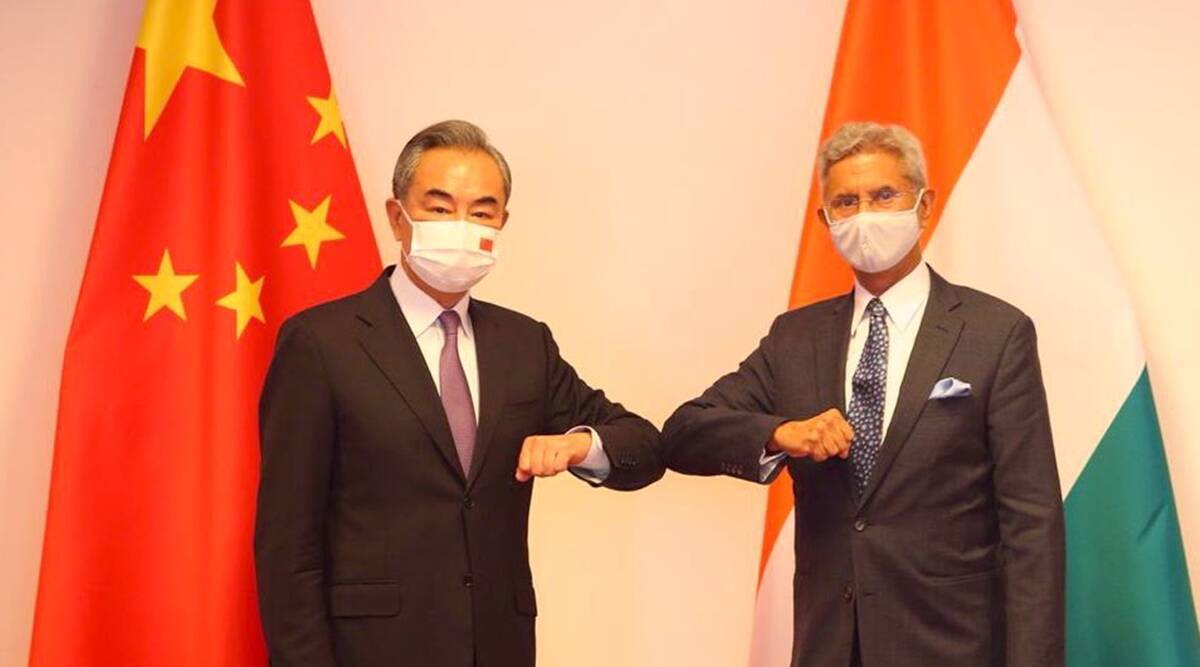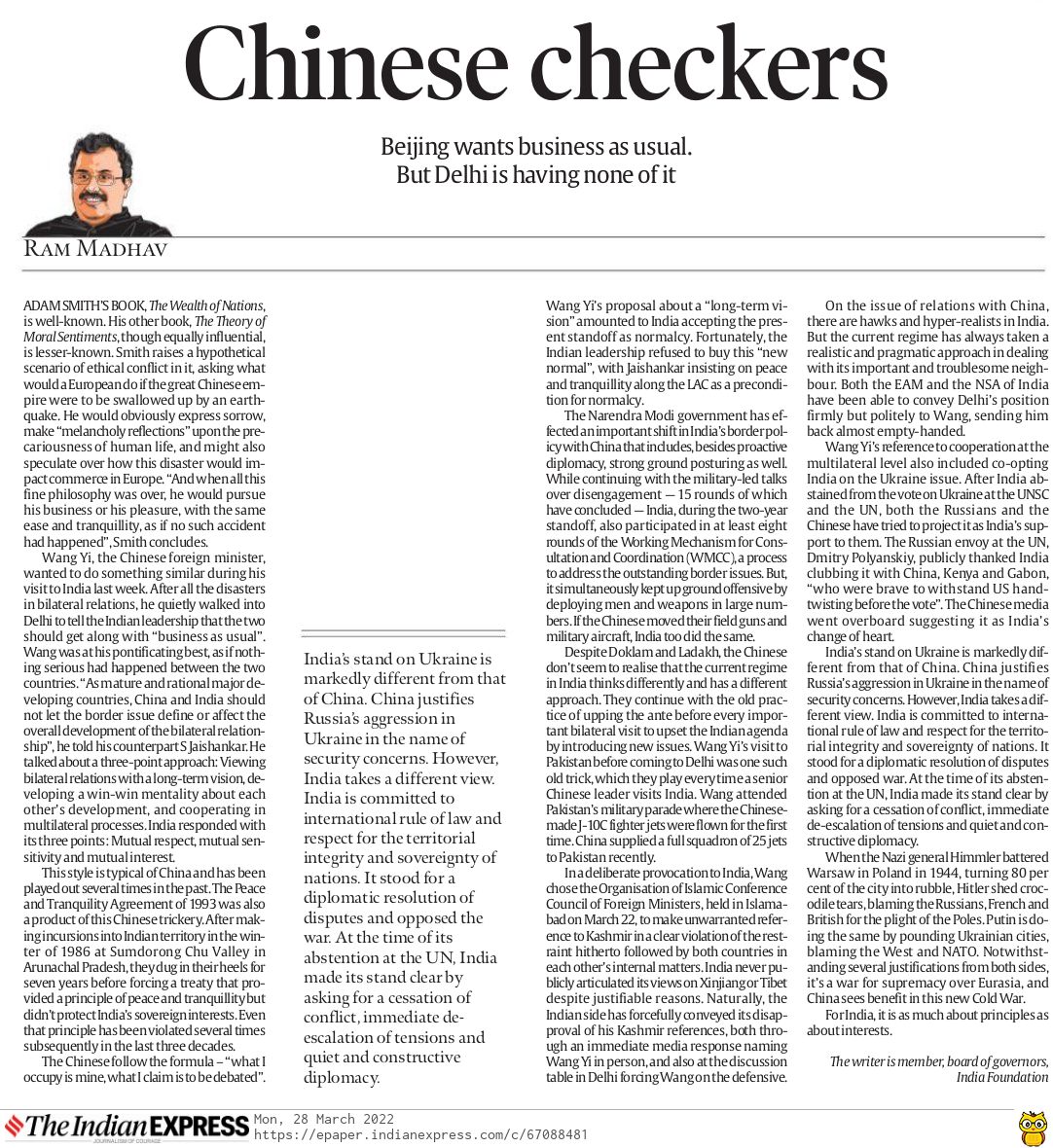
|
Getting your Trinity Audio player ready...
|
(The article was originally published in Indian Express on March 28, 2022. Views expressed are personal.)
Adam Smith’s book, The Wealth of Nations, is well-known. His other book, The Theory of Moral Sentiments, though equally influential, is lesser-known. Smith raises a hypothetical scenario of ethical conflict in it, asking what would a European do if the great Chinese empire were to be swallowed up by an earthquake. He would obviously express sorrow, make “melancholy reflections” upon the precariousness of human life, and might also speculate over how this disaster would impact commerce in Europe. “And when all this fine philosophy was over, he would pursue his business or his pleasure, with the same ease and tranquillity, as if no such accident had happened”, Smith concludes.
Wang Yi, the Chinese foreign minister, wanted to do something similar during his visit to India last week. After all the disasters in bilateral relations, he quietly walked into Delhi to tell the Indian leadership that the two should get along with “business as usual”. Wang was at his pontificating best, as if nothing serious had happened between the two countries. “As mature and rational major developing countries, China and India should not let the border issue define or affect the overall development of the bilateral relationship”, he told his counterpart S Jaishankar. He talked about a three-point approach: Viewing bilateral relations with a long-term vision, developing a win-win mentality about each other’s development, and cooperating in multilateral processes. India responded with its three points: Mutual respect, mutual sensitivity and mutual interest.
This style is typical of China and has been played out several times in the past. The Peace and Tranquility Agreement of 1993 was also a product of this Chinese trickery. After making incursions into Indian territory in the winter of 1986 at Sumdorong Chu Valley in Arunachal Pradesh, they dug in their heels for seven years before forcing a treaty that provided a principle of peace and tranquillity but didn’t protect India’s sovereign interests. Even that principle has been violated several times subsequently in the last three decades.
The Chinese follow the formula – “what I occupy is mine, what I claim is to be debated”. Wang Yi’s proposal about a “long-term vision” amounted to India accepting the present standoff as normalcy. Fortunately, the Indian leadership refused to buy this “new normal”, with Jaishankar insisting on peace and tranquillity along the LAC as a precondition for normalcy.
The Narendra Modi government has effected an important shift in India’s border policy with China that includes, besides proactive diplomacy, strong ground posturing as well. While continuing with the military-led talks over disengagement — 15 rounds of which have concluded — India, during the two-year standoff, also participated in at least eight rounds of the Working Mechanism for Consultation and Coordination (WMCC), a process to address the outstanding border issues. But, it simultaneously kept up ground offensive by deploying men and weapons in large numbers. If the Chinese moved their field guns and military aircraft, India too did the same.
Despite Doklam and Ladakh, the Chinese don’t seem to realise that the current regime in India thinks differently and has a different approach. They continue with the old practice of upping the ante before every important bilateral visit to upset the Indian agenda by introducing new issues. Wang Yi’s visit to Pakistan before coming to Delhi was one such old trick, which they play every time a senior Chinese leader visits India. Wang attended Pakistan’s military parade where the Chinese-made J-10C fighter jets were flown for the first time. China supplied a full squadron of 25 jets to Pakistan recently.
In a deliberate provocation to India, Wang chose the Organisation of Islamic Conference Council of Foreign Ministers, held in Islamabad on March 22, to make unwarranted reference to Kashmir in a clear violation of the restraint hitherto followed by both countries in each other’s internal matters. India never publicly articulated its views on Xinjiang or Tibet despite justifiable reasons. Naturally, the Indian side has forcefully conveyed its disapproval of his Kashmir references, both through an immediate media response naming Wang Yi in person, and also at the discussion table in Delhi forcing Wang on the defensive.
On the issue of relations with China, there are hawks and hyper-realists in India. But the current regime has always taken a realistic and pragmatic approach in dealing with its important and troublesome neighbour. Both the EAM and the NSA of India have been able to convey Delhi’s position firmly but politely to Wang, sending him back almost empty-handed.
Wang Yi’s reference to cooperation at the multilateral level also included co-opting India on the Ukraine issue. After India abstained from the vote on Ukraine at the UNSC and the UN, both the Russians and the Chinese have tried to project it as India’s support to them. The Russian envoy at the UN, Dmitry Polyanskiy, publicly thanked India clubbing it with China, Kenya and Gabon, “who were brave to withstand US hand-twisting before the vote”. The Chinese media went overboard suggesting it as India’s change of heart.
India’s stand on Ukraine is markedly different from that of China. China justifies Russia’s aggression in Ukraine in the name of security concerns. However, India takes a different view. India is committed to international rule of law and respect for the territorial integrity and sovereignty of nations. It stood for a diplomatic resolution of disputes and opposed war. At the time of its abstention at the UN, India made its stand clear by asking for a cessation of conflict, immediate de-escalation of tensions and quiet and constructive diplomacy.
When the Nazi general Himmler battered Warsaw in Poland in 1944, turning 80 per cent of the city into rubble, Hitler shed crocodile tears, blaming the Russians, French and British for the plight of the Poles. Putin is doing the same by pounding Ukrainian cities, blaming the West and NATO. Notwithstanding several justifications from both sides, it’s a war for supremacy over Eurasia, and China sees benefit in this new Cold War.
For India, it is as much about principles as about interests.





Very good analysis. On Ukraine war and China’s Wang Yi visit Ram Madhav made a rational analysis. Agree with all his views.